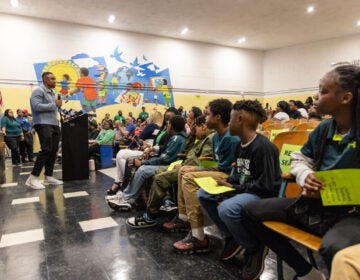Mentors and youth forge strong ties, but struggle to bridge racial divide
Listen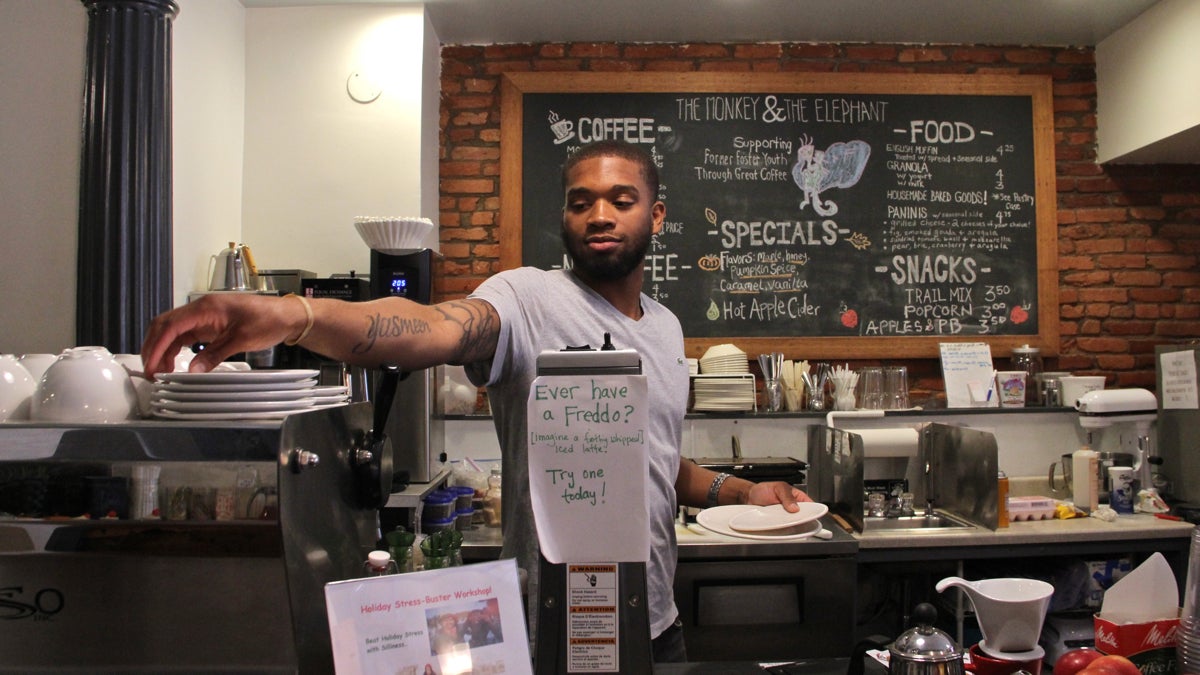
Naje Taylor works as a barista at The Monkey & The Elephant cafe in Brewerytown. (Emma Lee/WHYY)
When you see Naje Taylor behind the counter of The Monkey and The Elephant cafe, his face shows no signs of past scars.
But they’re there.
Taylor, who grew up in neighborhoods across South and North Philadelphia, was put into a foster home about a decade ago, and, since, has shouldered his way through adolescence with a weary air of indefatigable hope.
“I really honestly didn’t know why I was in foster care when I went in,” he said. “Only thing I was worried about was getting home.”
Taylor, now 20, has never known his father, who he believes lives somewhere in the city. He was separated from his two siblings and sent into foster care at age eleven when his mother could no longer handle the pressures of parenthood.
“She kind of exploded mentally, and it kind of took a turn for the worse,” he said, choking back tears. “One thing that I was scared of was her not knowing me anymore.”
Taylor lived with his mother again for few years in his late teens, but the relationship has been complex, and often tortured. He admires her greatly for her strengths and proudly wears her name tattooed on his forearm.
But the sting of her abandonment still lingers, and he struggles to imagine a future where the past ceases to haunt him.
“I’ve had some very, very terrible moments,” he said. “But I just try to stay positive, always tell her I love her, send her pictures, try to see her when I can.”
Despite his rocky upbringing, Taylor managed to graduate high school, and, since, he’s been working a mix of jobs and living in a transitional shelter in Kensington.
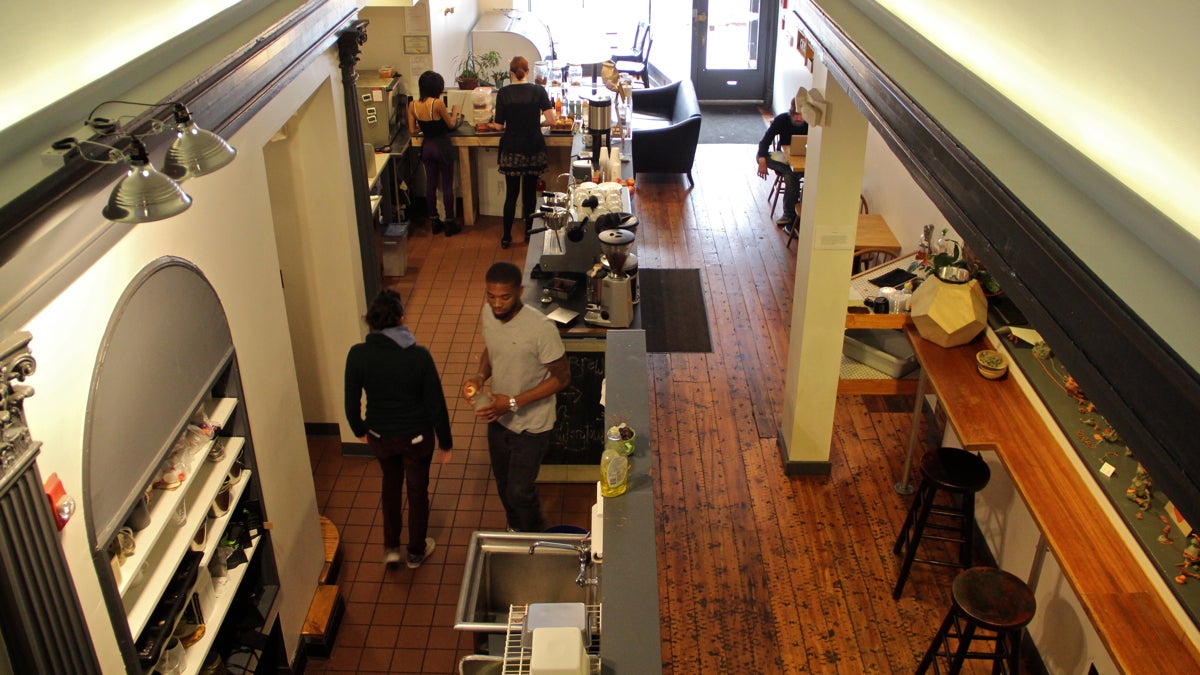 Most of the employees at The Monkey & The Elephant cafe are former foster youth like Naje Taylor. (Emma Lee/WHYY)
Most of the employees at The Monkey & The Elephant cafe are former foster youth like Naje Taylor. (Emma Lee/WHYY)
One of those has been as a barista at The Monkey and The Elephant in Brewerytown. There, the scent of roasted mocha rises thick in the air, the hubbub of warm conversation bounces off of exposed brick, and the whir of the bean grinder intermittently drowns out the indie-rock.
But it’s far from your typical coffee shop.
“No, not at all. The goal is to give youth who have been in the foster care system an opportunity to break the cycle of system involvement, whether that’s reliance on public assistance or having their kids end up in the foster care system themselves,” said Lisa Miccolis, who founded the shop.
Miccolis runs the operation with two managers who have years of coffee experience. The rest of the employees are former foster youth — most have been African-American young men, like Taylor.
Through an eight-month program, mentees get help with things like opening a bank account, finding stable housing, learning how to budget, and connecting with counseling services if interested.
“So we’re really looking at the whole individual, figuring out what their needs are and figuring out how we can address them using the coffee shop as the vehicle to do all of that,” she said.
But Miccolis, who’s a white 31-year-old raised in the suburbs, is upfront that she comes from a very different world than her mentees.
“I think everyday I attempt to figure out how as a young white female I can connect with a bunch of young black men,” she said.
“But I think to a point, if I don’t do it, who’s going to do it? If I didn’t start this organization, nobody was going to start this organization,” she continued. “So should I not do it because I’m white? Or should I do it and give it my all and do my best and own the fact that, yes, I’m white, and, yes, I grew up in a more privileged background, and use that as my fuel to actually do that work that I know needs to be done.”
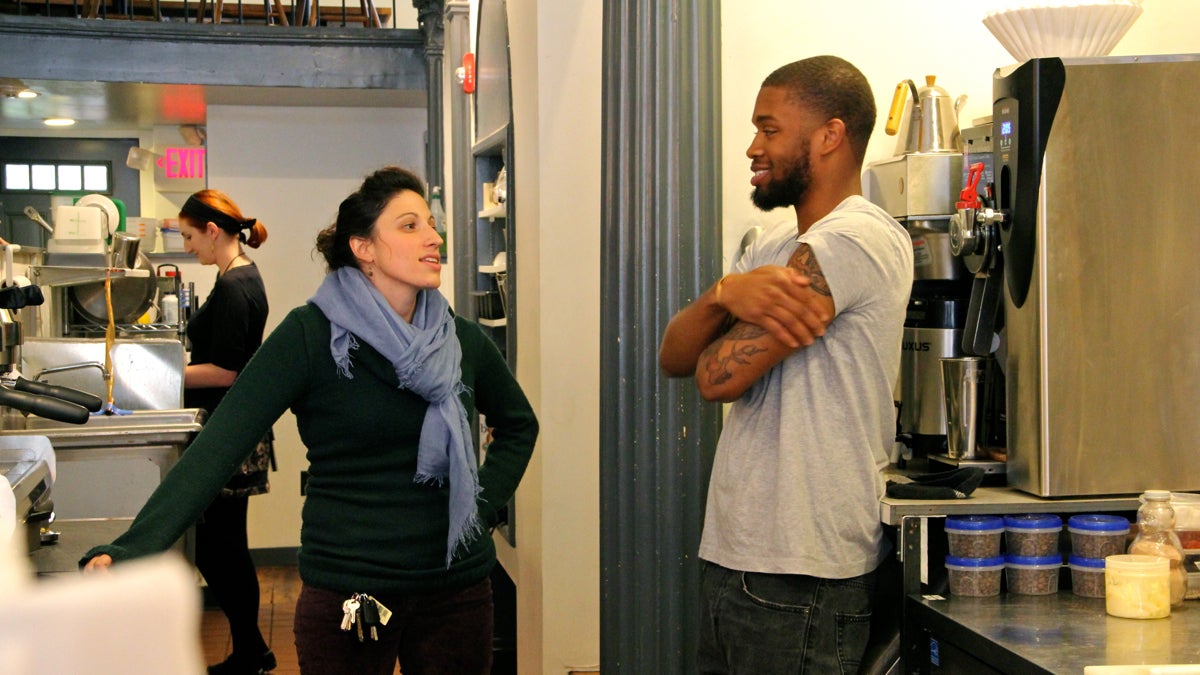 Naje Taylor and his mentor, Lisa Miccolis talk behind the counter at The Monkey & The Elephant cafe. (Emma Lee/WHYY)
Naje Taylor and his mentor, Lisa Miccolis talk behind the counter at The Monkey & The Elephant cafe. (Emma Lee/WHYY)
For Taylor, Miccolis’ efforts have been worthwhile. He credits the coffee shop for boosting his self-esteem and giving him a forum where he can interact with people of all races, creeds and income levels.
“Mentally, it just lets me know that I belong,” he said. “Mentally, it just lets me know that — when it’s all said and done — I can come to work and know that somebody cares about how my day was, or what I go through or what my accomplishments are.”
But he says the racial divide between them is real, especially when it comes to taking on the big, often culturally sensitive, issues in the news.
“I can’t really talk about Trayvon Martin or different things and expect to hear genuine answers. I really don’t expect it,” he said. “I can’t really talk about world issues with Lisa or any of the staff members. I don’t want to say that I don’t want to put them in that position, because I’d love to talk to them about it, to hear what they have to say.”
This dynamic isn’t a surprise the mentorship community at large.
“People who are mentoring in formal mentoring programs, tend to be white and tend to be more wealthy,” said Abigail Ellis, the executive director of the Mentoring Partnership & Resource Center, which helps mentor programs around southeast Pennsylvania.
In the wake of the Black Lives Matter movement, spurred by the deaths of Martin, Eric Garner, Michael Brown, and Freddie Gray, Ellis’ group has begun holding training seminars that push mentors like Miccolis to better address race and privilege in their work.
“We need to change the narrative around young black men and help them create positive self-identities, and mentors are in a great position to do that,” said Ellis, “but we want to make sure that they have the skills and techniques that they need — and the confidence — to do that as well.”
Spurred in part by that training, recently, on Taylor’s last day of the program at the coffee shop, Miccolis gave him a sort-of exit interview where the pair reflected on their relationship as they sat side-by-side in a cozy upstairs booth.
Taylor urged Miccolis to be more bold about sensitive subjects, saying the more she gives, the more the mentees will open up themselves.
“To really crack somebody’s cranium, metaphorically, it’s like, you really have to touch topics that you don’t want to touch,” he said.
Miccolis agreed.
“There’s so many things that have happened in the past year, that we’ve loosely talked about but maybe not in depth as much as we could – to the point of me saying: Naje, how do you feel about this? Do you feel that your life is at risk? Do you feel that you could do something to change this?” said Miccolis.
“We have talked about it but maybe not to the extent that we could have for me to understand exactly what his feelings and thoughts were that went along with all of those horrible things that have happened.”
The need for this openness has become especially important in recent years as the number of African-American educators, often natural mentors, has dwindled.
In the Philadelphia school district, 86 percent of students are racial minorities, but only 31 percent of teachers are, a gap that has significantly widened.
Although not as a teacher, Naje Taylor hopes to become part of the solution.
Following Miccolis’ lead, he’s already become a mentor himself to foster kids in their young teens. He hopes one day to become a full-time child advocate for the department of human services.
There, he’s confident he can make a difference for kids of all races.
“I want people to light up when they see my face, and know that Mr. Taylor is going to be there for them,” he said. “That’s the type of guy I am.”
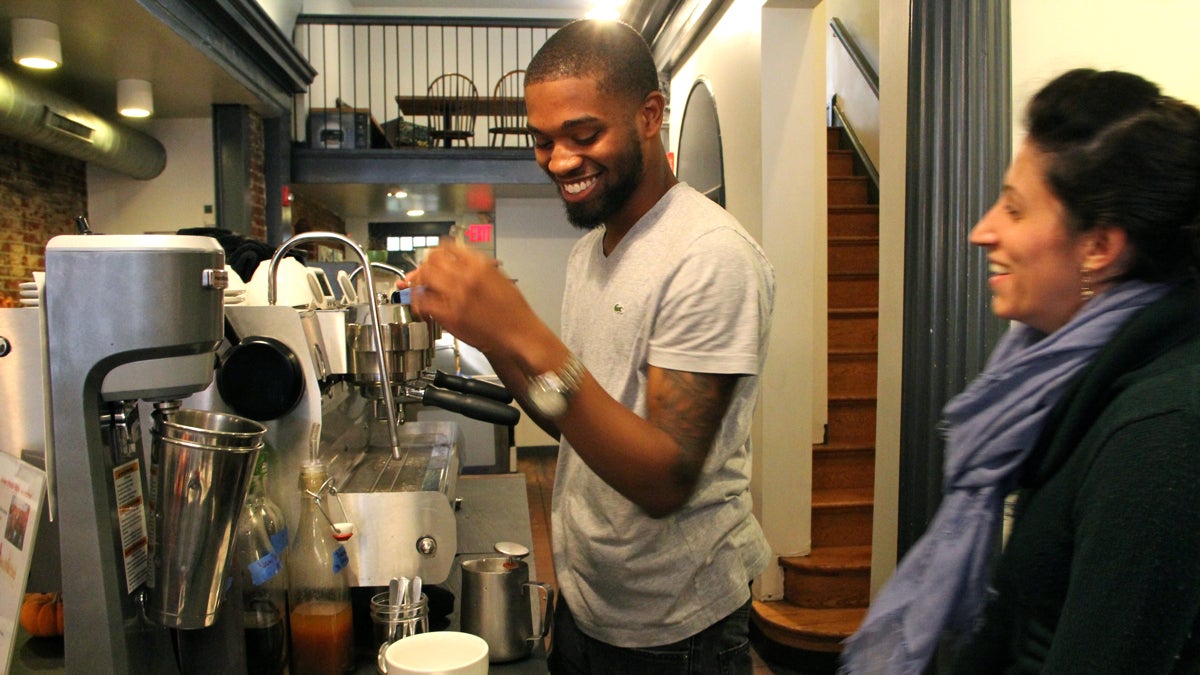 Naje Taylor draws a coffee at The Monkey and The Elephant coffee shop while he shares a laugh with his mentor, Lisa Miccolis. (Emma Lee/WHYY)
Naje Taylor draws a coffee at The Monkey and The Elephant coffee shop while he shares a laugh with his mentor, Lisa Miccolis. (Emma Lee/WHYY)
Taylor attended Arise Academy for high school, a charter that served only fostered youth – many who entered with intermittent records in the school system. Arise was shuttered by the School Reform Commission in the Spring based on fiscal problems and the low academic performance of its students.
Like many students who testified in its favor over the years, Taylor spoke highly of the school, specifically its ability to create a welcoming community among a student body facing profound social and emotional difficulties.
At the closure hearing, the school’s acting CEO urged the SRC to ensure there would be a smooth, caring transition for her students.
In a follow up correspondence with the district, it could not be determined that this happened – as students ended up in an array of district and charter schools across the city. In general, though, district officials say they are adept at serving students with deep needs.
WHYY is your source for fact-based, in-depth journalism and information. As a nonprofit organization, we rely on financial support from readers like you. Please give today.



